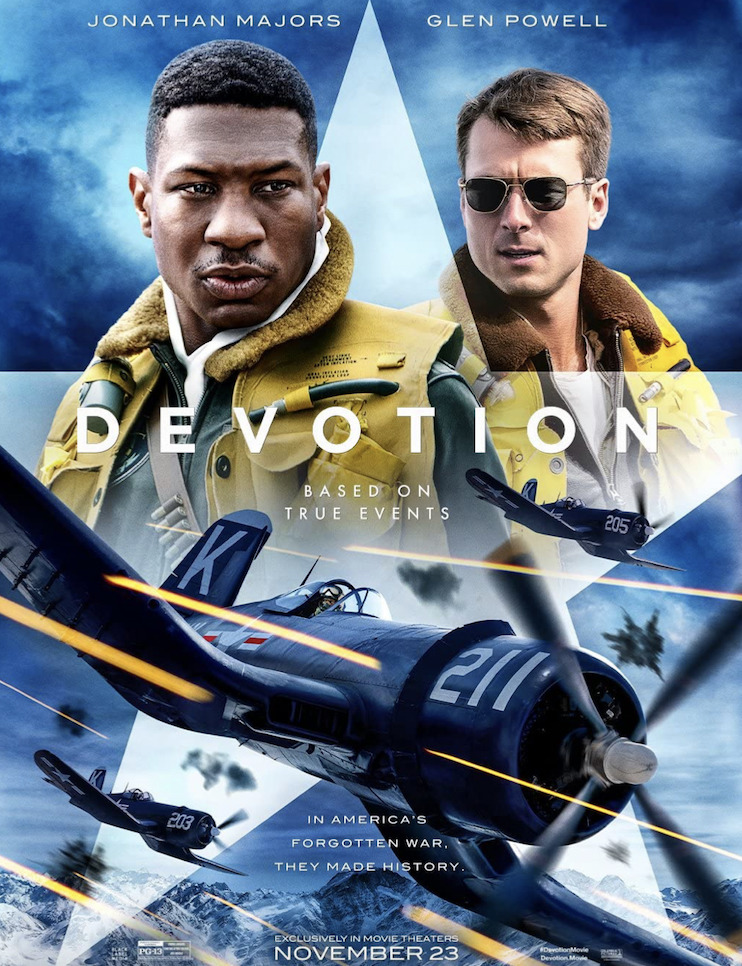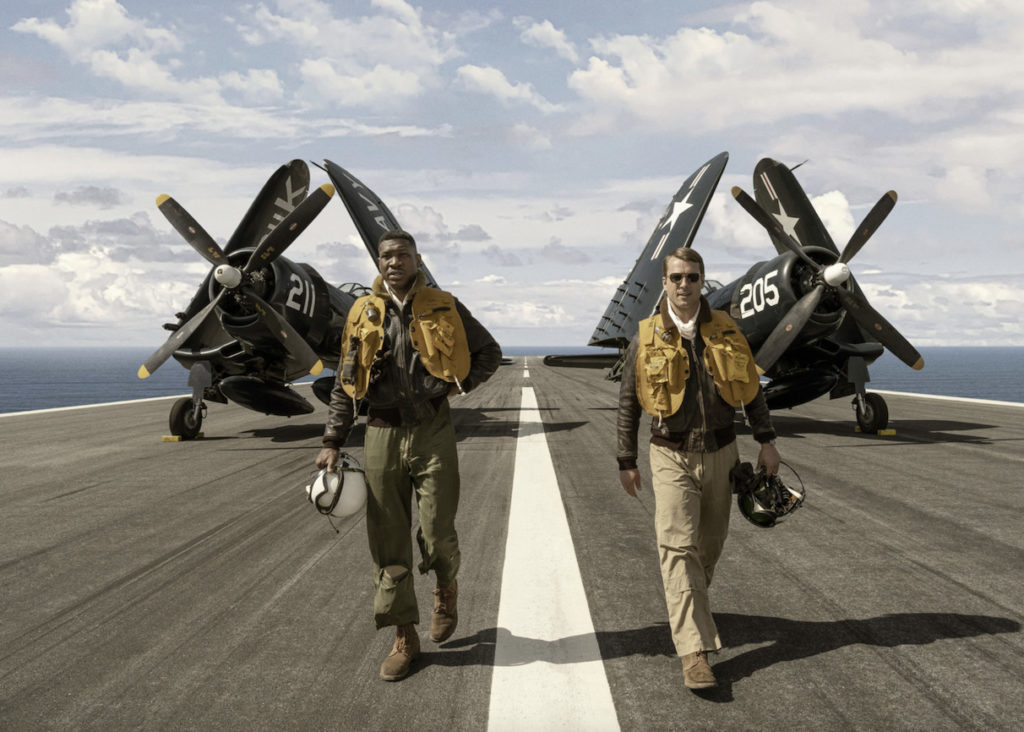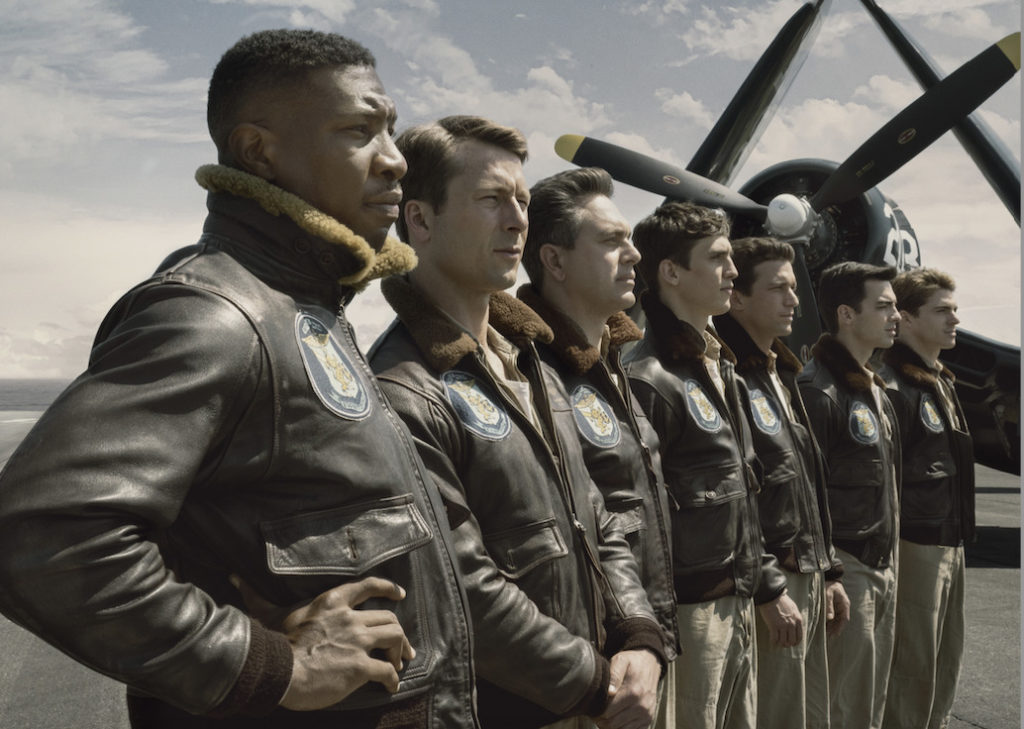
Q&A with Actors Jonathan Majors, Glen Powell, Thomas Sadoski and Director J.D. Dillard
Q: The first question is about J.D.’s childhood and father. J.D., can you talk about your personal connection to this material?
JDD: Yeah. I’ve been obsessed with aviation and waltzed in and around that world for a long time, and that’s in part because my first memories are all associated with that. My dad, thirty years after Jesse, was also a naval aviator. I grew up in Virginia Beach and Pensacola, and quite literally my first memory the moment my consciousness came on line was putting my hand on the nose of an F‑18 after an air show, in his arms.
So I started looking for something to honor that truly, quite probably, whether it was science fiction, or a true story. In that process, I was introduced in a really big way to Jesse and Tom and I saw so much overlay in what my dad experienced and what Jesse experienced.
There are jobs that you want to do, and there are jobs that you feel that you are called to do. This felt like an honor.
Q: Glen, you had read the book, can you tell us the story of the book?
GP: Yeah, I read the book in 2017, my uncle gave it to me. I thought it would make a really great movie. But someone else had the rights at the time, so I had to figure out how to unravel that because I found out they were never planning on making this movie.
I got the rights, I slid into the DMs of our writer Adam Makos [the author of the book]. He said “Would you want to be Tom Hudner?” I went to Concord, Massachusetts and met with Tom Hudner and his family and got the rights to the story. Then shortly after that, I met with the Brown family and got their blessing.
Five years later — it’s been a wild ride. I will say that Black Label Media — this was right after I shot “Hidden Figures” — they were the ones who really doubled down on this. This is a story that’s a big gamble. It’s not an obvious story for a lot of studios and they took a massive gamble to make this movie, and a massive gamble with me and my passion for it.
Looking back on that journey five years later, and the fact that we’re here, I’m very grateful to have had partners that have kept that passion all the way through, it’s been very important.
Q: What was it like when you met J.D.?
GP: J.D. Dillard is a very special man. When we were searching for filmmakers for this movie, nobody seemed like they were measuring up to how I felt about this movie. I thought this was an incredible story that needed someone who would care about it as much as we did.
When J.D. walked in, not only did he have a passion for aviation and obviously an affinity for naval aviation through his father, but he understood the nuance. He understood the life experience, he understood all the intricacies that are necessary to tell this story in a way that is modern and also in a way that actually affects audiences. There’s a way to boil this down to its simplest elements that is not effective, and that doesn’t change people’s hearts or minds. I feel like J.D. is a really special soul that understands that, and that also has the filmic ability to direct emotionally. I’m sure many of you cried tonight.
Thank you, J.D. Dillard. He’s got this ability to affect you with the camera, to frame things in a way that the audience is affected. It’s a rare quality. He does heart and scope in equal parts, it’s really an incredible thing and very rare in a filmmaker.
Q: J.D., talk to us about finding your Jesse?
JDD: Well, it was a very direct process. When I first began with Black Label, it was “I would love to do this movie, and Jonathan Majors is Jesse Brown”. Now we hadn’t spoken about that yet. But it’s such a tricky role to hold multitudes and both quiet moments and loud ones, and to show strength but also show vulnerability.
As Jonathan and I got to know each other, and we got to work with each other, what really became — one of the ways we were not reduced, but we would talk about in this light: “Can we use all the crayons in the box?” When you think about that from a casting standpoint, you want an actor who can access not just the primary colors but also, like, “Okay, we need to talk about the fifty different shades of blue we could use for this scene,” and to have someone that can actually differentiate those shades. It’s the key to the movie working, and it’s also incredibly difficult to find from that. I knew from the get-go there was talent, no shooting the film without Jonathan being Jesse.

Q: Jonathan, when you first read this script, what was it about Jesse that you knew that you could bring so much of yourself to it? You don’t just “act” in this film. I know you were very involved with J.D. in figuring out who Jesse was — in the air, on the ground, in all of the relationships that we see?
JM: Well, first, thank you all for being here.
To the question, what was it about Jesse that made me feel like I should try to take hold of him? I mean, he’s better than me. He’s just better. There are characters that come up in our storybooks that we look at and go “Oh, man,” we aspire to be that individual. Sometimes its comic books, sometimes it’s religious texts, sometimes it’s the Brothers Grimm. In this case, for me, it’s “Devotion”, and what I saw in Jesse was a man who modeled heroism in a way that I actually could not imagine.
That’s the thing about playing a character that’s walked and talked and lived. It’s not imagination, it’s sense direction. He inspired me so much. He was telling secrets that the moment in the mirror where I read that scene and went “Oh, no, wait. You’re not really going to do this, are you? You’re not really going to tell this part of human experience. Okay. Well how can you do that? You must be braver than me.”
That’s what you want. That’s what I want as an artist. We can add in the fact that he’s from Mississippi and I’m from Texas. He grew up piss-poor, I grew up piss-poor. He had great aspirations, I had great aspirations. All that’s there, of course. But primarily, I saw a man that I would want to be. I knew his story that had been told, and this is the handshake. We have many stories about brother King and [Malcolm] X, Harriet Tubman, JFK — all these great historical figures. And this is our first shot at Jesse, and all those things combined make him a figure.
Q: What was it like the first time Glen and Jonathan met? I think the story involved a sauna?
GP: I’ll let you take this, Jon.
JM: I came to New York City for the first time when I was 19 years old. On that trip — I was coming from the Berkshires, right? — I was with a guy who was playing a clown, Lancelot Gobo, I was playing Valentine [ in “Two Gentlemen of Verona”]. We get in the car, we drive down. Before we get to any house, we go to this place called a “Russian Turkish Bath”. Okay. I was 19 years old, I’m 33 years old now. You do the math.
So I’m in the very first place, and I had to finish the script. I happened to be in town this particular cold, cold evening. I got a phone call. They were saying, “Hey, this amazing script, I’ve already met with brother J.D.” And I knew that the “Proud Mary” of our relationship, the piece for this put me to work is between Lieutenant Tom Hudner and Ensign Jesse Brown.
So the most important thing to me was, who am I really kidding? Who am I going to do this thing with? This is the coach, but who is the quarterback and the wide receiver? Who’s the quarterback and the running back? How’s that going to work? And it’s Glen Powell.
I went viral. Where’s the Smith sister? There’s the Smith sister, that’s our producer. She and her sister said, “This guy wants to meet Glen Powell — the Glen Powell — in a sauna?” Yes, we do got to go to Dallas, as we say where I’m from. That means put it all on the line. So they asked him, and he shows up. He comes walking down the street. Who knows where the Turkish bath is?
So we’re in the middle of it. We’re in the East Village. We’re in there, right? And here comes this guy, and what do you think? What’s he wearing? A flight jacket. I’m not kidding. I was saying, “You know Tom Cruise. Cool.” So this brother shows up. It’s very strange that we’re meeting in this place.
You can take it from here.
GP: We hadn’t gotten to the bathhouse yet. We’re out in the front on the street.
JM: So we get in there, this man, Glen Powell, our Moses, comes to this place. It’s quite uncomfortable, to be honest. He looks me in the eye, he’s quite uncomfortable. I’m uncomfortable that he’s so uncomfortable. But he begins to lock in and break down this story with me. He tells me what he told you guys, how he found this book. He tells me about his father — what a great man he is, and his relationship to the book. The relationship between Jesse and Tom, and what it’s going to take to tell this story.
Again, I thought with Jesse, this man might be braver than me. This man might be smarter than me. I’ll follow him. I’ll have to see how far it takes me. We had the conversation, and he broke down the part and the legacy of these two men, and the promises that he had made. And I felt, I’m going to be your ally in this, if you’ll have me. And I enlisted. There’s a lot more that happened in the bathhouse. That’s the gist of it.
Q: Thomas, when you came on board this project, did you have to be their superior, their elder stateman? Did you feel that way in real life?
TS: There was no worry at all that I was going to be anybody’s superior. That was never on the table. I’m not with these two gentlemen. At present, I’m not with J.D. in charge, not with the reality of the story. At no point was there ever going to be any sort of concern about anybody being a “superior”. It is totally anathema to the story, and totally anathema to who these people actually were.
In terms of being the “elder statesman”, there’s [nothing] I can do about that . . .
Yeah, walking on the set and realizing that these are the people that you’re going to be working with in the scene, with the level of dedication, with the level of professionalism, with the level of care and with the level of creativity that they have already brought to the project — or even the first action.
It was pretty incredible talking to J.D. the first time when we had our first Zoom call — I think it was about 45 seconds in, when something in my brain clicked over and went, this is the person that I need to be working with, whatever it will take to get this job, to get me into this job. I’ll do whatever. I’ll be Ensign Calloway with a mop. Whatever it takes.
They asked me on board to have the honor and responsibility of bringing Richard Cevoli to artistic life, and to attempt to honor the man and his family by telling a little bit of his story to the world. It was an incredible thing that we got on set and things started — as they do with great people — things started flying in a really beautiful way. I spent my time in Savannah learning, observing and joining, and celebrating the incredible people that I got to work with and for, and it was frankly the job of a lifetime for me.
JDD: Real quick, if I could. I don’t get to give this man peaceful hours as long as I would like to. Thomas has an incredibly difficult job because there are so many moments where he has to tell us all what’s going on in the world and what it means — not just for the boys, but for also the state of the war. A beautiful thing, and it was really an important part of our initial conversation.
With the emotional reality that we’re building, you don’t want the gruff, detached, “This is the mission, nuff said.” What was so specific for Cevoli in reality was that he was just a half-generation ahead of them. That line of demarcation was like a year and a half. So to be able to speak to them barely above them but still with them, in charge of them but also alongside them, is such a specific quality that our dear friend Thomas brought to this. To me, basing it into the organic platform of what it really means to be stuck between generations.
GP: I will also say that the vulnerability of that character in real life, the vulnerability of Tommy in real life, is what makes this all so different. The fact that the vulnerability of all these men can be shown, with a gruff coach, you have to protect certain things. There’s a freedom that you have with a C.O. [commanding officer] that grounds those things in human form and not just in military form, that I think really opens this movie up in a really beautiful way.
TS: Thank you all. I think part of the beauty of what happens in the real world is something that I keep on landing back with this story. But these are real men, this really happened. The 32s were simultaneously of, and totally outside of, their time. They were outside of the limitations of their time in many, many ways.
Part of what makes this story so special — what made playing this part such a gift — was that there wasn’t a chance to fall into any sort of entrapping, existing real life. I think on some level not only was Cevoli just a generation and a half ahead, like J.D. wisely said, but also he realized the difference between snapping boys into men and leading men. There’s a degree of courage that comes with leading with compassion and connection, and there’s a respect that is set by leading in that way that allows everybody to actually have access to the best parts of themselves so they can exist outside of the limitations of their time. So they can exist outside the limitations of their culture. And these men actually did that.
On some small level — not to say that they weren’t completely handicapped by blind spots in some ways also. And there was a way in which they succeeded that was special, and arguably this story’s special, so special, and that makes it that much more additionally resonant, particularly at this time.
Q: Can you tell us about any reactions you have received from Jesse’s family and Tom’s family?
GP: One thing that we have all felt in this process is, we’re here to tell a good story, of course. At the same time, we are visitors and guests in the legacies of real people. That balance is a tricky thing to walk because sometimes the movie, the narrative, wants something and what really happened is what really happened. You navigate that in so many ways across the process.
You do it in the writing, you do it when you’re rehearsing, you come to set. There are so many conversations that Jesse and Daisy had, and that we will actually never know what they were talking about. So many conversations that Jesse and Tom had that we will never really know what really happened. That becomes the bedrock of a lot of the work that happens with [Jesse, Tom and Dick].
In terms of the families’ involvement, we shared the script early, we invited them to set, we made them part of this process, part of this family. Perhaps one of the scariest moments in my journey with showing this movie for the first time, because it is a very specific moment where you actually are watching with people who care less about the narrative and more about the imprint it makes on their legacy in that they have held on their own without our help or involvement at all, for seventy years.
So I’m very grateful that they were happy and remained part of that family. And we are all freshened from L.A. today after our premiere last night and spent a good part of that evening hugging them and crying and getting to celebrate this moment together as we can take this story and share it with more people. Because it certainly is a story that deserves that.
Yeah, it’s a balance. It’s truly a balance, but we’re grateful that we landed in a place where everyone can be so happy.
TS: The part of the reason that everybody on the stage is so passionate about this project is not only the promise that Tom Hudner made to Jesse and to Daisy, but the promise that Glen Powell made to Tom Hudner, that we were to carry the legacy of these people and we are to continue Tom’s work, which was unfinished, to repatriate Jesse Brown, one of America’s great war heroes. He has been [overseas] for far too long, to repatriate him back to the United States to a place that, at the time, could not love him nor deserved him. This place now might be able to open its heart to an exceptional person with exceptional gifts, and know the reality of his truth where we are now.
That’s a big torch to carry. We carry it and we will pass it to you because it is through momentum and love that we’re going to get people to change their minds.
GP: I did a movie called “Hidden Figures” a few years ago, I watched how that movie changed the lives of everybody due to the fact that nobody knew who Catherine Johnson was and her impact on the world. And those women who were responsible for such a great moment for the world and a great narrative moment. After that movie, there were natron buildings all over NASA and it encouraged an entire wave of young women in Stanton, particularly young African American women in Stanton, which can change the world. Right?
So movies can change the world. “Devotion” can change the world. I’m hoping we can get closer to family with this movie. So thank you guys for watching this.

Check out more of Nobuhiro’s articles.
Here’s the trailer of the film.

